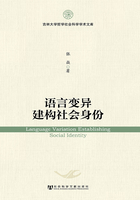
Abstract
A linguistic view point w hich is against the dialectics has considered society the determ inative part in the relationship betw een language and society. And to certify the determ inative function of language over society, the author argued the identity establishing function by taking the exam ple of “W enge” English, w hich m eans the English taught at colleges during the cultural revolution.
W ith its background of the cultural revolution, the “W enge” English was created by the college teachers in the aim of rescuing their falling identity and fate. Right after the founding of PRC , the identity of college teachers was to a certain extent high in the China Society, w hile after the broke - out of the cultural revolution it fell abruptly. Due to the inner consentm ent of Chairm an Maotow ards the intellectuals, and together with the born discrim ination in their mind, college English teachers were violently attacked and persecuted, and their m ajor job, the English teaching, helped the persecution.
In order to get recognized by the society and rejoin the revolution, the college English teachers had to give in to the political clim ax and try to seek w ays to avoid the fatal shadow. By the im itation of the Chinese language spoken during the cultural revolution, a brand new style of English—“W enge” English was established , w hose aim was to show to the around that the college teachers w ere becom ing revolutionary.
“W enge” English had a tw o - part strategy: political content and popular level. The form er refers to a political reflection of vocabulary, syntax, intonation and text ; while the latter means to lower the grammatical level so as to get accept ed by the m axim um popularity. A ccording to this strategy, the establishm ent of their identity got undergoing w ith respect to the construction of political im age, class stand and m ental consciousness.
The construction of political im age contains the translation of m any political Chinese w ords and sentences into English, by speaking this style f English, they presented them selves to the society a im age of being very political, their im age was therefore establsihed. Their class stand was establsihed by em ploying w ords and sentences m ainly refer to those concerning w orkers, peasants, soldiers,w hom w ere considered belong to the m ost revolutionary class. Amental consciousness was establsihed by a course of political texts selection and edition.
The above - m entioned establishm ent certified that language does hold a function of constructing social identity, the conclusion fulfills the dialectical analysis of the relationship betw een language and society, besides, the ways of the application of the function are also presented. The first way to apply this function is called language dem ocracy, w hich m eans the allow ance of various language to share the right of its social existence; the other one is called language technology, w hich m eans the language adjustm ent in interpersonal or inter - social com m unications.
Social identity construction has supplem ented the study of language variation in Linguistics and the theory of social construction in sociology. It not only represented the situation of the college English teachers in the cultural revolution, but also explored their w ay of inventing the Cultural Revolution English. The case study has exem plified the function of social identity construction, and the corresponding application w ill m ake a contribution to the developm ent of both linguistic and social research.